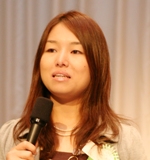��New Generation Month�� Meeting
��Motivation Disparities Lead to Future
Economic Disparities in Japan -Challenges
of NPO Katariba��
September 1, 2010
Ms. Kumi Imamura
President and Chief Executive Officer
Non Profit Organization Katariba
 ��At the outset, let me ask you three questions. First question, do you think you have average competence? Second question, do you regard yourself inferior to others? Third question, do you think you can make a positive contribution to improve society? Please rate your answers from A) Absolutely yes, B) Positive, C) Negative, to D) Never.
��At the outset, let me ask you three questions. First question, do you think you have average competence? Second question, do you regard yourself inferior to others? Third question, do you think you can make a positive contribution to improve society? Please rate your answers from A) Absolutely yes, B) Positive, C) Negative, to D) Never.
��These questions were given last year by the Japan Youth Research Institute to the junior and senior high school students living in Japan, China, the US and South Korea. The results showed that 46.7% (1.56 million students out of 3.35 million) of the Japanese high school students responded negative (either C or D) on the first question. On the second question, 65.8% (2.2million students out of 3.35 million) answered positive (either A or B), while on the third question, 68.3% (2.3 million students out of 3.35 million) answered negative (either C or D). This survey results indicated that Japanese high school students, living in one of the most affluent countries, have poor sense of self-affirmation.
��I was a university student 10 years ago. My parents run a souvenir store in my hometown Takayama City in Gifu Prefecture. I come from an ordinary family, and nobody in my family has ever gone to university.
��When I was a child, I never dreamt of studying at university. I regarded myself inferior to others with no competence. I never thought I could make a positive contribution to change society. I was not a diligent student, with no motivation for the future. I was idling around in my high school days.
��Just then, I got interested in living away from home. I knew I could convince my parents if I left home for my studies in Tokyo. This is how I came to prepare for the university entrance exams. I was lucky enough to enter Keio University by the so-called AO (admissions office) exams, without going through scholastic tests.
��As a freshman student, I was impressed by the sharpness and confidence of fellow students who had studied for the very competitive entrance exams. They were good at discussions and had excellent presentation skills. What impressed me the most was that many students were highly motivated, with ambition to deal with social issues.
��Lectures at the university were based on group works. I first tried to avoid making presentations, yet I gradually started to embrace new challenges and enjoyed my university life.
��As a sophomore student, I went back home to celebrate my coming-of-age ceremony. I met my former junior high school friends, after some years, and was shocked to see how much I had been changed by my university life. I realized the environment and people around you make an enormous impact on your values, motivation and positive approach towards life.
��As a senior student, I thought deeply about my future career. My personal experience of living in two very different communities and environments made me determined to encourage ��young people in Japan to hold strong self-motivation.�� This is how I came to establish KATARIBA (place for talking), to encourage inter-generation communication within local communities and families.
��(DVD on ��High School Career Learning Program�� was shown, introducing the activities of KATARIBA members at high schools in Tokyo.)
���� University students and high school students talk about their future. High school students become very enthusiastic in asking advice from university students on future academic or career course.
���� High school students write their specific ��goals for action�� at the end of the session. Students have a clearer vision of their future goals and dreams.
���� Teachers appreciate this opportunity for students to talk frankly on their worries with senior students.
��High school students have access to abundant information today. Yet they lack the opportunity to meet someone who impresses and inspires them. Today, as many as 4,000 members have joined KATARIBA. These members visit high schools and send out messages on what they themselves wanted to do three years ago. Members encourage high school students to reveal their feelings and through communication and presentation trainings to share their feelings. KATARIBA is a good learning opportunity for members as well.
��High school students are eager to meet new people who understand them despite sometimes being scolded by them. KATARIBA provides such opportunities for encounters in class rooms.
��We asked students whether they have any role model or somebody they admire. 28% of them answered ��yes��, while 70% answered ��no�� and 2% were unsure. Students have ��vertical relations�� with their teachers or family members. They have ��horizontal relations�� with their close friends and classmates. So KATARIBA aims at providing ��diagonal relations�� with senior students close in age and free from prejudice or interests, so that students will have an opportunity to reflect on themselves.
��KATARIBA also tries to build networks among high school students and companies. We encourage students to make company visits, and ask company workers to visit schools and give lectures. Let me conclude by asking for your understanding and support for our activities.